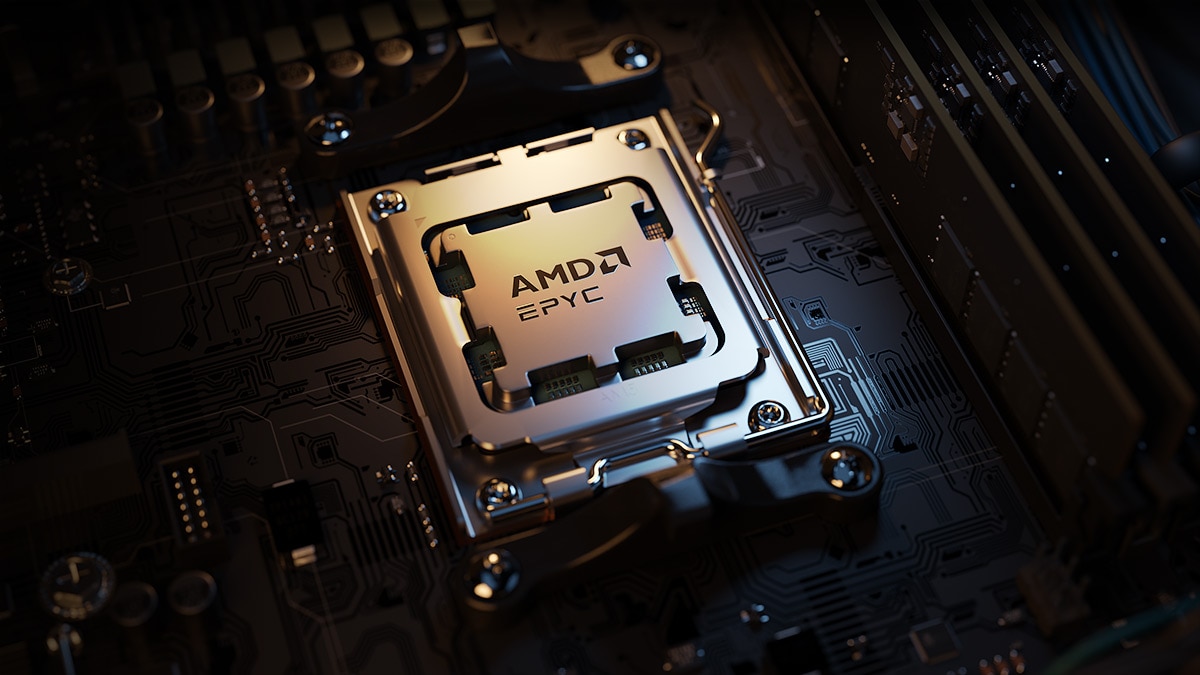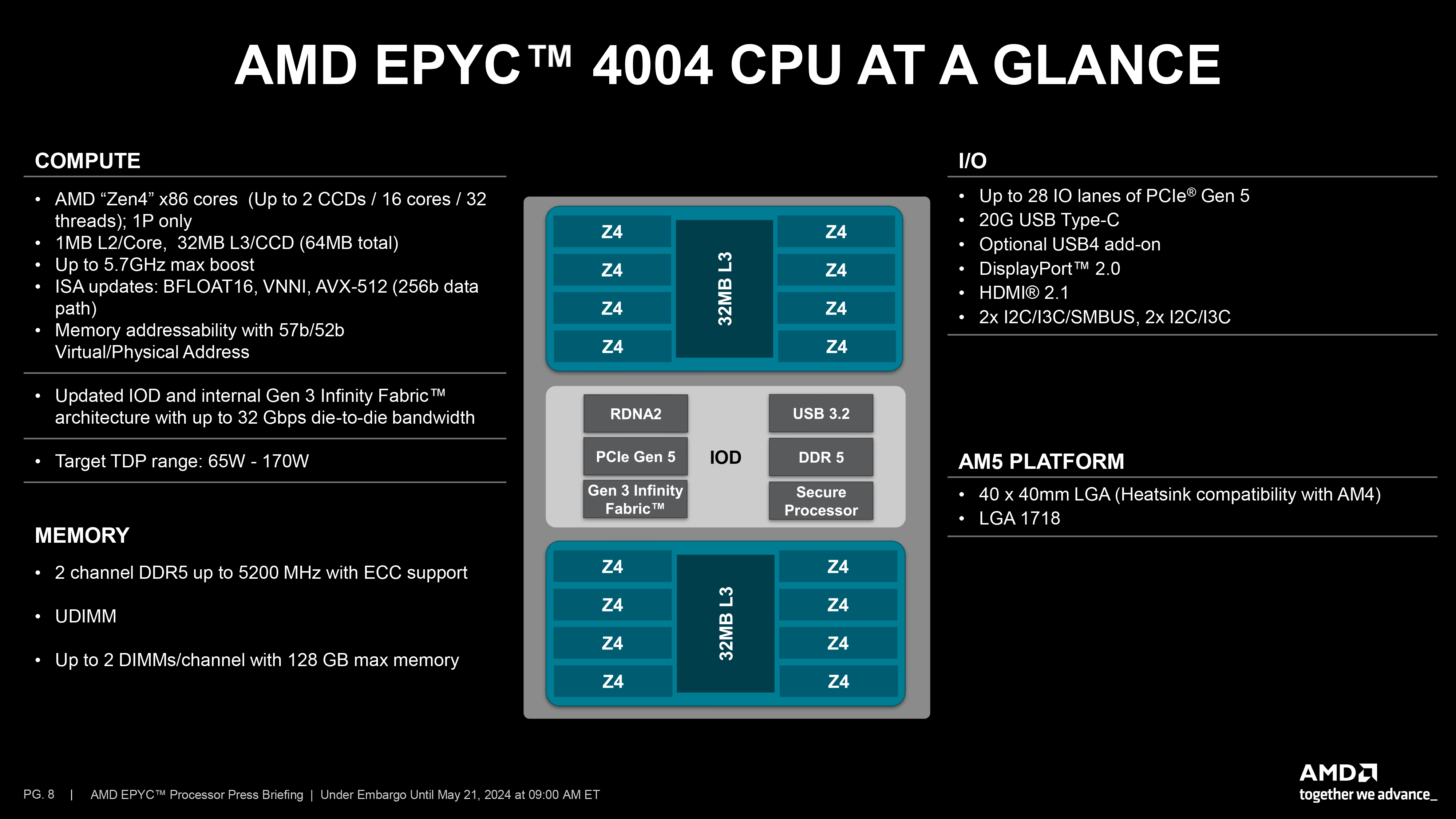AMD unveils EPYC 4004 CPUs: AM5 gets server-grade processors
Entry-level AMD 4004-series EPYC CPUs.

AMD introduced its EPYC 4004-series processors aimed at entry-level single socket servers designed for dedicated hosting and small businesses. The new EPYC 4004-series CPUs feature up to 16 cores and use AM5 packaging, providing a cost-effective platform that supports essential enterprise-grade capabilities.
AMD's EPYC 4004 processors are essentially Ryzen 7000-series CPUs with four, six, eight, 12 or 16 cores, up to 5.70 GHz boost clocks, up to 64 MB L3 cache, and up to 28 PCIe Gen5 lanes. The EPYC chips support up to 192 GB of DDR5-5200 memory with ECC. The platform features RAIDXpert2 for servers, AMD secure processor enclave, and transparent memory encryption (TSME). The EPYC 4004 lineup includes eight models with TDPs of 65W–170W.
| Row 0 - Cell 0 | Cores | L3 Cache (MB) | TDP | Base Frequency | Boost Frequency | Price |
| EPYC 4564P | 16 | 64 | 170W | 4.5 GHz | 5.7 GHz | $699 |
| EPYC 4464P | 12 | 64 | 65W | 3.7 GHz | 5.4 GHz | $429 |
| EPYC 4364P | 8 | 32 | 105W | 4.5 GHz | 5.4 GHz | $399 |
| EPYC 4344P | 8 | 32 | 65W | 3.8 GHz | 5.3 GHz | $329 |
| EPYC 4244P | 6 | 32 | 65W | 3.8GhZ | 5.1 GHz | $229 |
| EPYC 4124P | 4 | 16 | 65W | 3.8GhZ | 5.1 GHz | $149 |
| EPYC 4584PX | 16 | 128 | 120W | 4.2 GHz | 5.7 GHz | $699 |
| EPYC 4484PX | 12 | 128 | 120W | 4.4 GHz | 5.6 GHz | $599 |
AMD will have six EPYC 4004P-series processors ranging from the 4-core 4124P up to the 16-core 4564P. Other than support for ECC memory and the server-grade functionality, these are effectively the same as the Ryzen 7000-series CPUs. In addition, there are two EPYC 4004PX-class processors, the 4584PX and 4484PX, both boasting 128MB of combined L3 cache. These are the EPYC equivalents of the Ryzen 9 7950X3D and Ryzen 9 7900X3D CPUs that have an extra stack of cache over one of the CCDs.
AMD positions its EPYC 4004-series CPUs for a wide range of applications, including general-purpose small business servers, branch servers, backup and storage servers, dedicated applications servers (e.g., for Adobe Premier Pro, compilation machines), cloud gaming machines, and e-commerce workloads. Technically, with EPYC 4004-series processors, AMD can address almost any use case where high processing performance and extended availability are required.
Systems based on the EPYC 4004-series will support RAID, BMC, and server-grade OSes. Speaking of operating systems, since Microsoft's Windows Server 2022 Datacenter and Standard Edition OSes support up to 16 core CPUs in the base price, EPYC 4004 will be an optimal choice for these platforms.
"Historically, many small to medium businesses have had to compromise on their IT solutions by using hardware that does not fully meet their needs," said John Morris, corporate vice president, Enterprise and HPC Business Group, AMD. "Based on the same technologies that power the most demanding data centers in the world, the AMD EPYC 4004-series processors are offered at an optimized acquisition cost for customers in small and medium-sized businesses seeking to drive better business outcomes."
AMD says that EPYC 4004-based machines will be shortly available from Altos (an Acer company), ASRock Rack, Gigabyte, MSI, Supermicro, and Tyan, with more OEMs coming later. In addition, dedicated hosting providers OVHcloud and Ionos will also make EPYC 4004-based servers available to their clients. More providers are qualifying AMD's new platform with planned availability in 2024.
Get Tom's Hardware's best news and in-depth reviews, straight to your inbox.

Anton Shilov is a contributing writer at Tom’s Hardware. Over the past couple of decades, he has covered everything from CPUs and GPUs to supercomputers and from modern process technologies and latest fab tools to high-tech industry trends.
-
usertests Wouldn't it be nice if ECC was standard (even if memory prices have to be jacked up ~15%) and not a confusing enterprise feature? No, not the DDR5 pseudo-ECC.Reply
Other than that, I guess these are the enterprise features:
The platform features RAIDXpert2 for servers, AMD secure processor enclave, and transparent memory encryption (TSME).
Pricing looks very reasonable compared to the Zen 4 desktop lineup, for carrying the Epyc name. EPYC 4124P looks like it's based on an APU die with half the L3 cache. -
One odd thing I noticed is that both the top two SKUs cost the same: EPYC 4564P and EPYC 4584PX costing $699 respectively !Reply
One is the 3D V-Cache variant with 128MB cache, and the other one is obviously the vanilla SKU. -
It's nice to see AMD also showcased a Cryptography and Cryptocurrency "CPU Mining" performance slide as well.Reply
EPYC 4004 CPUs appear to offer a 2.4x performance per $ gain, and 60% better efficiency.
https://cdn.wccftech.com/wp-content/uploads/2024/05/AMD-EPYC-4004-AM5-Desktop-CPUs-Official-_14.png -
cleavet These should outperform Intel's 4004 by a decent margin, especially in floating-point operations.Reply -
You mean to say the Xeon E-2400 CPU lineup ? How does that ancient 4-bit 4004 processor compare with this series ?Reply
-
helper800 Reply
I would say, very well.Metal Messiah. said:How does that ancient 4-bit 4004 processor compare with this series ? -
usertests Reply
That's amusing. Some (many?) customers will definitely prefer the vanilla one with higher clocks, and may have no applications at all that benefit from 3D V-Cache. So AMD might as well charge the same and see if they can get away with it.Metal Messiah. said:One odd thing I noticed is that both the top two SKUs cost the same: EPYC 4564P and EPYC 4584PX costing $699 respectively !
One is the 3D V-Cache variant with 128MB cache, and the other one is obviously the vanilla SKU.
Too bad AMD didn't take the opportunity to launch a dual cache model (192 MB total L3).
I don't know, but who needs it? These are clocked just as high as the identical Ryzen chips out of the box, which is unusually high for Epyc, and hitting up to 5.7 GHz which is still crazy to think about.LabRat 891 said:There's but one, incredibly important question:
Can we OC 'em?
https://www.anandtech.com/show/21406/one-more-epyc-amd-launches-entrylevel-zen-4based-epyc-4004-seriesThis does mean that, by EPYC server standards, the 4004 series is not particularly energy efficient. This is a lineup that is intended to be cost-effective first and foremost. Instead, energy efficiency remains the domain of the EPYC 8004, with its modestly-clocked many-core Zen4c designs.
-
abufrejoval Darn, I just built such a workstation, that I'd have liked to have a few enterprise featuresd like a BMC and on-board 10GBit!Reply
But that included a rather bad experience with regards to dual DIMMs per RAM channel for 128GB (or 192), which contrary to my AM4 experience, was a disaster. I had to settle with 96 GB in two DDR5-5600 ECC 48GB DIMMs which did cost as much as 128GB via 2x32GB.
The ASUS X670E board claims ECC support, so I guess that includes validation this time. On AM4 ECC "worked", but came without validation from the vendor.
Without error injection capabilities, I just had no way to make sure and I've not seen corrected errors on my systems yet, some of which run 24x7 from patchday to patchday.
When ECC DRAM cost a 100% markup, such lack of validation was a bit harder to stomach, these days the ECC markup is within the range of a slight overclock premium and I know where I place my bets.
Drivers that actually work on Windows 2022 would be a welcome change, that's been a pain in the rear since Windows 2008!
Software RAIDs have given me far too much trouble, too.
Things that really shouldn't work, did actually work. Like when I upgraded from an Intel Xeon E3-1280v3 to a Ryzen 9 5950X and a SATA SSD based RAID0 cache drive created via the Intel BIOS just kept on working on Windows 2022 just using a "raid" setting in the BIOS but no AMD drivers...
Even Linux recognises Intel softRAIDs, after all, so this kind of backward compatibility seems backed in in more places than ever officially advertised.
Yet when I replaced another Ryzen 9 5950X with a Ryzen 7950X3D, the AMD RAID0 (basically just an LLM cache) wouldn't be recognized for the longest time on Windows 10. Switched to a Windows 11 temporarily to create an HDD backup and it was picked up immediately!
And just when I had done the backup, another Windows 10 reboot gave me back the RAID!
No idea if some bit got flipped and then reset, but it wasn't an experience I enjoyed and I'd rather have Intel/AMD/Windows simply adopt Linux MD signatures and algorithms, which are vendor agnostic, fast and as robust as they can be.
The main feature I'd expect from this enterprise variant is support for per VM memory encryption, which IMHO is just the sort of feature fuse-off reserved for EPICs, that AMD was proud not to use, when they lauched Zen.
Can't say that I need it personally, but when it comes to deploying hardware on an edge where you can't entirely exclude malicious physical access, it could make a make or break difference.
These smaller machines tend to be far more exposed than the big servers! -
TerryLaze Reply
Because they are the same ryzen chips, there is no way AMD paid for the same validation as for actual epyc but then sells them so cheaply.usertests said:I don't know, but who needs it? These are clocked just as high as the identical Ryzen chips out of the box, which is unusually high for Epyc, and hitting up to 5.7 GHz which is still crazy to think about.
They just added the I/O ,ecc mem, and whatnot to a normal ryzen package.
